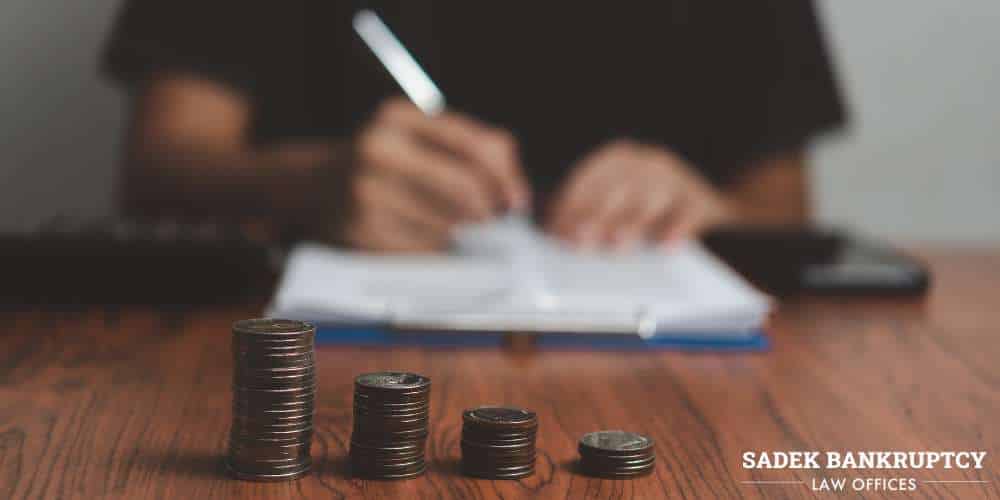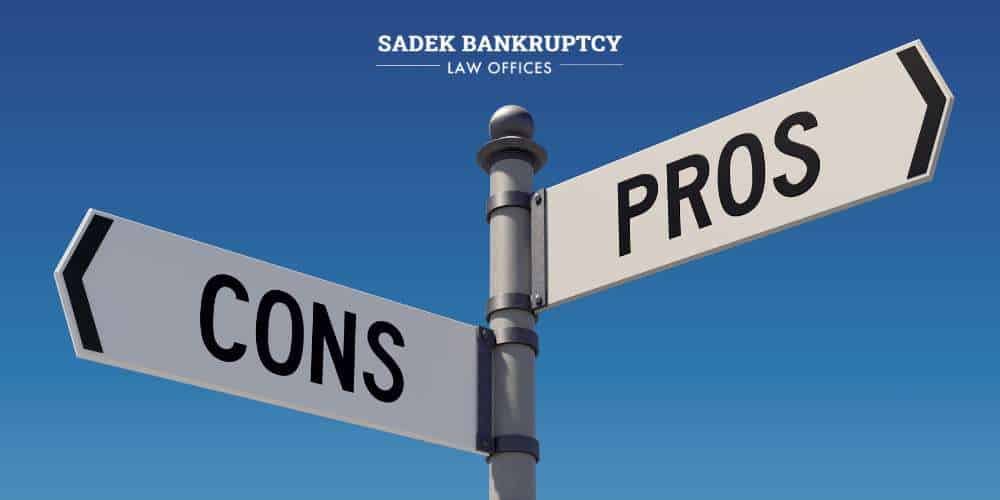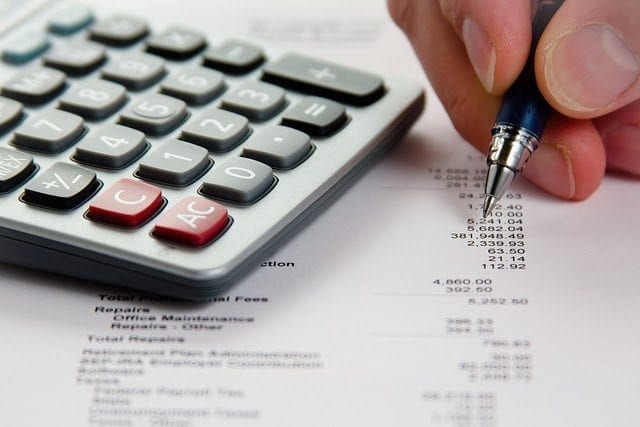The Bankruptcy Process in Pennsylvania
Top Bankruptcy Attorneys and Home Foreclosure Defense Attorneys.
Over 750 ★★★★★ Google Reviews

Contact Our Attorneys Today



EVALUATION
At Sadek Bankruptcy Law Offices, we realize that every situation is different. Our debt relief lawyers will take the time to learn about your situation and your goals. Our objective is to explain your legal options and offer the best debt relief strategy for you in the most compassionate and friendly manner possible. Call 24/7 to schedule your meeting with a lawyer.
AVAILABLE
Our office understands the financial stress our clients endure. Therefore, in addition to reasonable legal fees, we offer a payment plan to all of our valued clients to make quality legal services most affordable.
AND NJ
In addition to our primary law office in Center City, Philadelphia, we also have law offices throughout the Greater Philadelphia, Pennsylvania Area and in New Jersey. Our branch offices have contributed to making us the #1 Bankruptcy Filer and debt relief firm in the Greater Philadelphia area. Our goal is to have a convenient location within 20 minutes of where our clients work or reside.
Understanding the Pennsylvania Bankruptcy Process
Bankruptcy is a legal process that can wipe out your debts, prevent foreclosure, protect you from creditor harassment and debt collectors, and give you other financial benefits.
In this informational bankruptcy guide for Pennsylvania residents, the Philadelphia bankruptcy attorneys of Sadek Bankruptcy Law Offices, LLC explain the Pennsylvania bankruptcy process, including differences between Chapter 7 bankruptcy and Chapter 13 bankruptcy, and requirements for completing bankruptcy procedures in Pennsylvania successfully.
If you think bankruptcy could be right for your situation, or if you have any questions about the process of filing for bankruptcy in Pennsylvania, we encourage you to contact our law offices at (215)-545-0008 for a free bankruptcy consultation.
Our Southeast Pennsylvania bankruptcy law firm is proud to serve residents of Bucks, Delaware, Montgomery, and Philadelphia Counties, including Manayunk, Germantown, Northern Liberties, Levittown, Croydon, Bristol, Chester, Drexel Hill, Ardmore, Norristown, Pottstown, King of Prussia, and beyond.

What Are the Types of Bankruptcy Filings?
In the United States, individuals and businesses can file for bankruptcy under various chapters of the Bankruptcy Code, each designed to address different financial situations. The primary types of bankruptcy filings include Chapter 7, Chapter 11, Chapter 12, and Chapter 13.
Chapter 7 and Chapter 13 are the most common forms of bankruptcy for individuals. Chapter 11 is typically used by businesses seeking to reorganize and Chapter 12 is a type of bankruptcy filing designated for family farmers and fishermen.
Chapter 7 Bankruptcy
Chapter 7 bankruptcy, also known as liquidation bankruptcy, is designed for individuals who cannot repay their debts. In this process, a court-appointed trustee sells the debtor’s non-exempt assets to pay off creditors. Once the assets are liquidated and the proceeds distributed, any remaining eligible debts are discharged, providing the debtor with a fresh financial start. This includes many forms of unsecured debt.
However, not all debts can be discharged in Chapter 7 bankruptcy, including certain taxes, child support, alimony, and student loans. To qualify for Chapter 7, debtors must pass a means test, which compares their income to the median income of their state; if their income is too high, they may be required to file under Chapter 13 for debt relief instead.
Chapter 13 Bankruptcy
Chapter 13 bankruptcy, also known as a wage earner’s plan, allows individuals with regular income to develop a plan to repay all or part of their debts over three to five years. This type of bankruptcy is ideal for debtors who have significant assets they want to keep, such as a home or car, and can afford to make monthly payments toward their debts.
Under Chapter 13, debtors propose a repayment plan to the court, which must be approved by creditors and the bankruptcy judge. The repayment plan typically prioritizes secured debts, like mortgages and car loans, and may provide partial repayment to unsecured creditors. Once the debtor successfully completes the repayment plan, any remaining eligible debts are discharged. Chapter 13 can also help individuals catch up on missed mortgage or car payments and stop foreclosure or repossession.
No matter which chapter of bankruptcy is best for you, we always recommend working with a skilled and experienced bankruptcy lawyer.
How Much Debt Is Worth Filing Bankruptcy?
There is no specific amount of debt that automatically justifies bankruptcy; instead, it depends on the debtor’s ability to repay their debts and the overall impact of their financial obligations on their daily life. It is more important to evaluate how beneficial a bankruptcy discharge could be for the filer.
For Chapter 7 bankruptcy, individuals typically consider filing when their unsecured debts, such as credit card debt, medical bills, and personal loans, become overwhelming and unmanageable. If a debtor is unable to make minimum payments, facing wage garnishments, or being harassed by creditors, filing for Chapter 7 might be a viable option.
While there is no minimum debt requirement to file for bankruptcy, it is generally considered when unsecured debts exceed $10,000 to $15,000, and the debtor has little to no disposable income to repay these debts.

Chapter 13 bankruptcy is often considered by individuals who have regular income but are struggling with secured debts, such as a mortgage or car loan, and want to keep their assets. It is suitable for those who have fallen behind on payments but can catch up with a structured repayment plan.
Debtors typically file for Chapter 13 when their total debt burden, including both secured and unsecured debts, becomes unmanageable, often in the range of $20,000 to $50,000 or more. Chapter 13 can also be beneficial for those looking to reorganize their debts into a more manageable payment plan, allowing them to retain their property and avoid foreclosure or repossession.
What Happens to Debt When You File Chapter 7?
When you file for bankruptcy Chapter 7, most of your unsecured debts, such as credit card debt, medical bills, and personal loans, are discharged, meaning you are no longer legally required to repay them. A court-appointed trustee will sell your non-exempt assets to pay off as much of your debt as possible.
Once the liquidation process is complete and the proceeds are distributed to creditors, the remaining eligible debts are wiped out, giving you a fresh financial start. However, some debts, like certain taxes, student loans, child support, and alimony, are typically not dischargeable in Chapter 7 bankruptcy.
What Happens to Debt When You File Chapter 13?
When you file for Chapter 13 bankruptcy, you create a court-approved repayment plan to repay creditors over a period of three to five years based on your income and expenses. During this time, you make regular payments to a bankruptcy trustee, who then distributes the funds to your creditors.
This plan allows you to catch up on secured debts like a mortgage or car loan while potentially paying only a portion of your unsecured debts, such as credit card debt and medical bills. Once you successfully complete the repayment plan, any remaining eligible unsecured debts are discharged, providing you with a clean financial slate.
Pros and Cons of Filing Bankruptcy
Filing for bankruptcy is a significant financial decision that can help individuals and businesses manage or eliminate their financial burdens and repay outstanding debts. This legal process offers a structured way to deal with overwhelming debt but comes with its own set of pros and cons. Understanding these can help individuals make informed decisions about whether bankruptcy is the right option for them.

Bankruptcy Advantages
One of the main advantages of filing for bankruptcy is the ability to repay debts in a manageable way. For individuals filing under Chapter 13, the repayment plan allows them to keep valuable assets while catching up on missed payments over time.
Additionally, bankruptcy can provide relief from creditor harassment, wage garnishments, and foreclosure proceedings, allowing individuals to regain financial stability. For those filing under Chapter 7, the discharge of unsecured debts can provide a fresh start, free from the burden of insurmountable debt.
Bankruptcy Disadvantages
Although bankruptcy is an incredible option for many debtors, it is important to understand the potential drawbacks of filing bankruptcy. While our attorneys can help you mitigate the negative effects of bankruptcy by helping you practice good credit habits, we feel that educating clients about their options is paramount.
One of the most significant drawbacks is the impact on your credit report. A Chapter 7 bankruptcy can remain on your credit report for up to ten years, while a Chapter 13 bankruptcy can stay for up to seven years. This can make it difficult to obtain new credit, secure loans, or even rent an apartment.
Additionally, not all debts are dischargeable in bankruptcy, such as student loans, certain taxes, and alimony, which means individuals may still have financial obligations after the bankruptcy process is complete. The process can also be time-consuming and may require the sale of valuable assets, particularly in Chapter 7 bankruptcy.
How Does Bankruptcy Work in PA?

A person who files for bankruptcy is known as a “debtor,” “filer,” or “petitioner.” A person or company to whom the debtor owes money is called a “creditor.” The debtor may be a:
- Single individual
- Married individual, filing jointly with his or her spouse
- Married individual, filing individually
- Business owner
There can be advantages and disadvantages to filing jointly or individually for married couples. If you and your spouse are thinking about declaring bankruptcy separately or together, our attorneys can help you decide which approach would better help you attain your financial goals.
The primary purpose of bankruptcy is to help the debtor reduce, or in some cases completely eliminate, the debts he or she owes various creditors. Some debts need to be paid back in full, while other debts can be repaid for a fraction of what is actually owed. Debts that can be eliminated are called “dischargeable debts” and include:
- Business Debts
- Collection Agency Accounts
- Credit Card Debt
- Medical Bill Debt
- Older Income Tax Debt
- Past-Due Rent
- Past-Due Utility Bills
- Personal Loans
- Repossession Deficiency Balances
- Social Security Overpayments
- Veterans Assistance Loans
Debts that cannot be eliminated are called “non-dischargeable debts” and include:
- Alimony Payments
- Child Support Payments
- Criminal Restitution
- Government Fines and Penalties
- Most Student Loans
- Recent Income Tax Debt
The process your case will follow depends on what type of bankruptcy, or which bankruptcy “chapter,” you choose. While there are rare circumstances where Pennsylvania residents file Chapter 11 bankruptcy, the vast majority of personal bankruptcy cases involve either Chapter 7 bankruptcy or Chapter 13 bankruptcy.
PA Chapter 7 Bankruptcy Procedures
Other names for Chapter 7 bankruptcy include:
- Liquidation
- Ordinary Bankruptcy
- Straight Bankruptcy
How to File Chapter 7 Bankruptcy in Pennsylvania
The process begins when you file your bankruptcy petition and pay a $335 Chapter 7 filing fee. You will also be required to submit supporting paperwork describing your debts, assets, income, and other financial information.
Keep in mind that failure to provide complete and accurate information can result in dismissal of your case, leaving you stuck with your debts.
As soon as you file, you become protected by the “automatic stay” under federal law. The automatic stay stops (“stays”) debt collections while your case is pending, unless a creditor gains court approval to lift the stay.
Shortly after filing, the bankruptcy court will also assign a Chapter 7 bankruptcy trustee to your case. The trustee bears responsibility for administering the bankruptcy estate. In Chapter 7, the trustee’s role is to liquidate (sell) property and assets. Proceeds from the sale help you repay your debts.
How Does Bankruptcy Chapter 7 Work in Pennsylvania?
Fortunately, most Chapter 7 debtors can keep much or all of their property. There are two reasons for this:
- If the property has low value, the trustee may abandon it.
- Debtors can protect certain property with bankruptcy exemptions. Pennsylvania debtors may choose between two sets of exemptions: the Pennsylvania bankruptcy exemptions, or the federal bankruptcy exemptions.
Chapter 7 bankruptcy typically takes as little as four to six months to complete. While there are variations from case to case, a general Chapter 7 timeline includes the following steps:
- Before you can file bankruptcy in Pennsylvania, you must (1) meet residency requirements, and (2) undergo mandatory pre-bankruptcy credit counseling through an approved agency.
- You file Chapter 7 bankruptcy.
- You mail requested financial documents to the bankruptcy trustee.
- Approximately one month after filing, the bankruptcy court schedules a meeting of creditors. During this meeting, you will be interviewed by the trustee to ensure all of your information is accurate, complete, and up-to-date.
- Within 60 days of the meeting of creditors, you must undergo mandatory pre-discharge debtor education through an approved provider.
- Approximately 60 to 75 days after the meeting of creditors, the bankruptcy court should discharge your debts if you have followed the process properly.

Who Can Declare Chapter 7 Bankruptcy in Pennsylvania?
In Pennsylvania, individuals, partnerships, corporations, and other business entities can declare Chapter 7 bankruptcy, provided they meet specific eligibility requirements. To qualify, individuals must pass the means test, which compares their income to the median income of their state; if their income is below the median, they are eligible.
If their income is above the median, they must demonstrate that their disposable income is insufficient to repay a significant portion of their debts. Additionally, individuals must complete credit counseling from an approved agency within 180 days before filing. Certain prior bankruptcy filings or dismissals within specific timeframes may also affect eligibility.
Filers must meet all Chapter 7 filing requirements as they are listed in federal bankruptcy laws. Otherwise, a bankruptcy judge may deny a filer’s case or suggest that they file for another chapter instead.
What Can You Not Do After Filing Chapter 7?
After filing Chapter 7 bankruptcy, individuals are restricted from taking on new debts without court permission until their bankruptcy proceedings are finalized. This means they cannot incur new credit card debt, take out loans, or enter into significant financial transactions without approval from the bankruptcy court.
Additionally, they are prohibited from transferring property or assets to others to avoid having them included in the bankruptcy estate. Furthermore, individuals must attend a meeting of creditors and comply with all requirements set forth by the bankruptcy trustee.
PA Chapter 13 Bankruptcy Process
Other names for Chapter 13 bankruptcy include:
- Reorganization Bankruptcy
- Wage Earner’s Plan
How to File Chapter 13 Bankruptcy in Pennsylvania
Like Chapter 7, Chapter 13 begins with the filing of the bankruptcy petition, accompanied by a $310 Chapter 13 filing fee and supporting financial paperwork. Other similarities are that:
- A bankruptcy trustee will be assigned to your case shortly after filing.
- You will immediately gain the protection of the automatic stay, with some exceptions.
In Chapter 13 bankruptcy, nonexempt property and assets are not liquidated. In other words, you get to keep all of your property. However, you must propose, gain court approval for, and commit to a repayment plan, which will last for either three or five years.
How Does Chapter 13 Bankruptcy Work in Pennsylvania?
Under the repayment plan’s terms, you make monthly or biweekly payments to the Chapter 13 trustee, who then distributes the funds amongst your creditors. Funds are distributed based on the types of claims each creditor has. This includes:
- Secured Claims – These are debts “secured” by collateral, like a vehicle or a piece of property. Examples include auto loans and mortgages. These must be paid in full with interest in order to retain the property.
- Unsecured Priority Claims – These are debts given special priority by federal bankruptcy regulations. They typically must be paid in full. Examples include spousal support, child support, and newer income tax debts.
- General Unsecured Claims – Other debts belong in this category, and include utility bills, medical bills, credit card bills, and personal loans. You may pay less than what you owe on these debts, as long as your creditors receive at least the same amount that they would have received if you filed Chapter 7 instead of Chapter 13.
The process for Chapter 13 follows similar steps, including the meeting of creditors. However, the process is longer and more complicated than Chapter 7.
For example, after the meeting of creditors, you must attend a confirmation hearing for the court to approve your reorganization plan. You must begin making payments to the Chapter 13 trustee within 30 days of filing for bankruptcy, even if the court has not yet approved your plan at that time.
The Pennsylvania bankruptcy court in the eastern part of the state is the United States Bankruptcy Court for the Eastern District of Pennsylvania. It has two courthouses, which are located at the following addresses:
Robert N. C. Nix, Sr. Federal Courthouse
900 Market Street, Suite 400
Philadelphia, PA 19107
The Madison Building
400 Washington Street
Reading, PA 19601
Who Can Declare Chapter 13 Bankruptcy in Pennsylvania?
Chapter 13 bankruptcy is available to individuals who have a regular income and want to reorganize their debts through a court-approved repayment plan. This type of bankruptcy is suitable for individuals who can afford to make monthly payments to creditors over a period of three to five years. It allows debtors to retain valuable assets, such as their home or car, while catching up on missed payments and resolving past due debts.
Notably, there is also a debt limit associated with Chapter 13 filings. According to the United States Bankruptcy Courts website, one is eligible for Chapter 13 as long as their combined total secured and unsecured debts are less than $2,750,000 as of the filing date.
What Can You Not Do After Filing Chapter 13?
After filing Chapter 13 bankruptcy, individuals are subject to restrictions aimed at bankruptcy abuse prevention. They cannot incur new debts without court approval during the repayment plan period, which typically lasts three to five years. This means they cannot take out new credit cards, loans, or enter into significant financial transactions without permission from the bankruptcy court.
Additionally, debtors must obtain court approval before selling or transferring property, as this could affect their ability to adhere to the repayment plan and may violate bankruptcy laws aimed at preventing asset concealment.
Furthermore, debtors must continue making regular payments on secured debts like a mortgage or car loan to maintain possession of these assets. Failure to keep up with these payments can lead to foreclosure or repossession, despite the protection of the bankruptcy court. Compliance with all court-ordered obligations, including attending financial management courses and providing accurate financial information, is crucial to successfully completing the Chapter 13 repayment plan and obtaining a discharge of remaining eligible debts.
Bankruptcy Process FAQs
What Happens When You File for Bankruptcy?
When you file for bankruptcy, your case is processed through a federal court system designed to help individuals and businesses manage overwhelming debt. Upon filing, an automatic stay goes into effect, which halts most creditor actions, including collection calls, wage garnishments, and foreclosure proceedings.
A bankruptcy trustee is assigned to oversee your case, reviewing your financial situation, assets, and debts. Depending on the type of bankruptcy filed (such as Chapter 7 or Chapter 13), the trustee may liquidate non-exempt assets to repay creditors or establish a repayment plan that allows you to reorganize and repay debts over time.
What Qualifies You for Bankruptcies?
Qualifying for bankruptcy involves meeting specific criteria governed by federal law. Individuals typically qualify based on their financial situation, which may include overwhelming debt compared to income, inability to repay debts, or facing imminent foreclosure or repossession. Credit history and income play significant roles in determining eligibility for different types of bankruptcy.
However, some debts, such as federal student loans, are generally not dischargeable in bankruptcy unless the debtor can prove undue hardship through a separate legal process. Additionally, individuals must complete mandatory credit counseling within six months before filing and adhere to other procedural requirements established by bankruptcy laws.
What Disqualifies You from Filing Bankruptcies?
Several factors can disqualify individuals from filing for bankruptcy. These include the following.
- Failing to complete a credit counseling course from an approved agency within 180 days before filing
- Filing too soon after having filed bankruptcy before
- Having income or assets that are too highly valued
- Engaging in fraudulent behavior, such as concealing assets or providing false information

Philadelphia Attorneys Can Help You File Bankruptcy
Bankruptcy is a complicated procedure, but can yield great rewards, including foreclosure prevention, debt reduction, protection from debt collectors, improved ability to build good credit in the future, and invaluable peace of mind that your finances are stable again.
To learn more about filing Chapter 7 bankruptcy in Pennsylvania or filing Chapter 13 bankruptcy in Pennsylvania, contact the Philadelphia bankruptcy attorneys of Sadek Bankruptcy Law Offices, LLC at (215)-545-0008 today for a free and confidential legal consultation.
